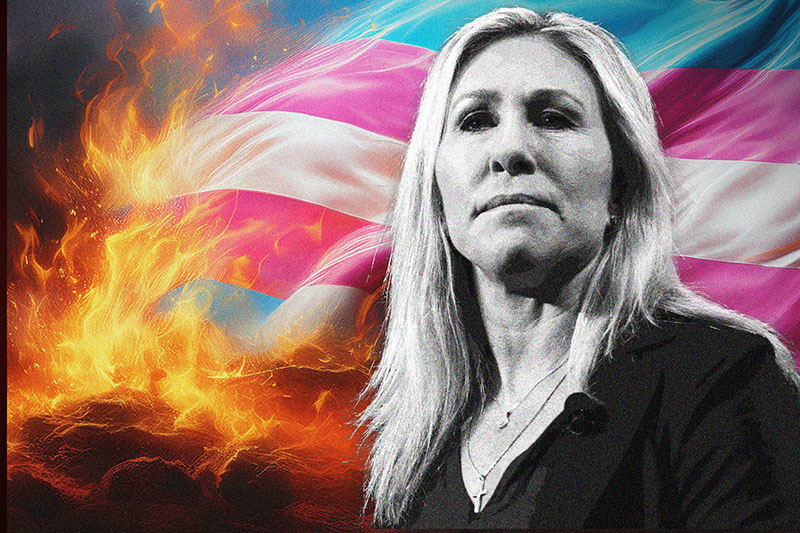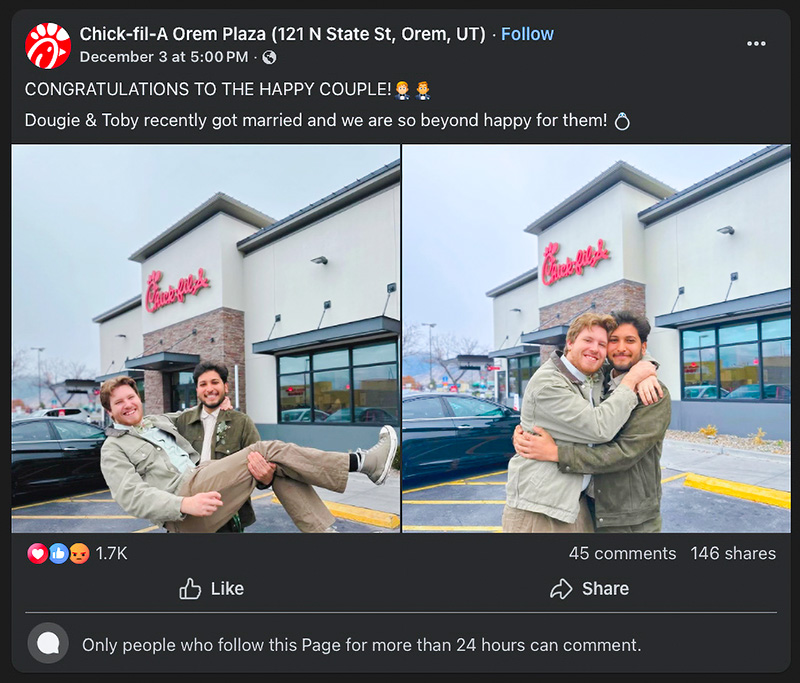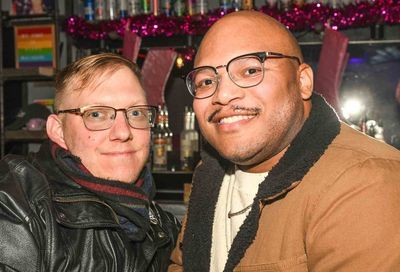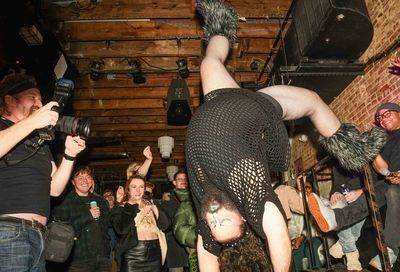Virginia Moves Closer to Killing Gay Marriage Ban
Lawmakers take the first of two votes needed to push for a ballot measure to overturn the hated Marshall-Newman Amendment.

Both chambers of the Virginia General Assembly took a step closer to removing a currently unenforceable ban on same-sex marriage from the Constitution of Virginia in the past week, setting the stage for a showdown at the ballot box in 2026.
On January 14, the House of Delegates voted 58-35 to pass an amendment to prohibit authorities from refusing to issue marriage licenses to “two parties contemplating a lawful marriage” on the basis of the couple’s sex, gender, or race. Seven Republicans voted with all the chamber’s Democrats in favor of repeal. Five more Republicans did not vote, while two others abstained.
On January 21, the Senate voted 24-15 to approve the amendment, with three swing-district Republicans — Sens. Danny Diggs (Yorktown), Tara Durant (Fredericksburg), and David Suetterlein (Roanoke) — siding with all of the chamber’s Democrats.
One swing-district Republican, Sen. Emily Jordan (neé Brewer) (R-Smithfield), did not vote. Jordan also did not vote when she was a member of the House of Delegates on a nearly identical 2021 measure seeking to remove the marriage ban from the Virginia Constitution.
Some House Republicans attempted to convince their fellow lawmakers to reject the measure, which would repeal the Marshall-Newman Amendment, a 2006 voter-approved constitutional amendment that prohibits marriage between anyone who is not a heterosexual couple.
Del. Nick Freitas (R-Culpeper) claimed that the measure should be defeated because it does not address the ability of religious clergy to decline to perform marriages.
However, last year, the House and Senate passed a law, signed into effect by Republican Gov. Glenn Youngkin, that protects the right of same-sex couples to marry and allows any religious clergy or organizations to refuse to perform or participate in a same-sex wedding. Democrats pointed to that precise law to prove that religious objectors are already protected.
LGBTQ advocates fully expect anti-LGBTQ forces to run well-financed attack ads regurgitating Freitas’ flawed arguments — reminiscent of those used to argue against marriage equality in other states over a decade ago — should the repeal measure ever make it to the ballot.
Similarly, Minority Leader Todd Gilbert (R-Woodstock) — an anti-LGBTQ lawmaker, who, when he was Speaker of the House, blocked votes to repeal the ban on same-sex nuptials — objected to the fact that the amendment doesn’t distinguish between sex and gender.
“That notion should at least give us pause that maybe this is not ready, and that pushing ahead with it is not in the best interest of Virginia,” he said, as reported by Virginia Public Media.
The fate of the amendment to overturn the prohibition on same-sex couples marrying relies heavily on the ability of Democrats to retain control over the House of Delegates in next November’s elections when voters will also elect a new governor and lieutenant governor and decide whether to grant right-wing Attorney General Jason Miyares a second term.
Under Virginia law, a proposed constitutional amendment must be approved by a majority of the legislature in two separate sessions that are separated by a state election cycle. If approved a second time in 2026, after the 2025 elections, the approved amendment will head to the ballot for approval by voters in the next federal election, which would be the 2026 midterms.
If approved by voters, the amendment — which does not require the approval of Gov. Youngkin — would immediately take effect, removing the ban on same-sex marriage from the state constitution.
However, the prohibition on same-sex marriage was later rendered moot in 2014, after a federal appeals court upheld a judge’s ruling declaring both the amendment, and a similar statutory ban, to be discriminatory and unconstitutional. That was reinforced a year later by the U.S. Supreme Court’s ruling striking down all state-level and constitutional bans on marriage equality.
In 2020, a Democratic-controlled House of Delegates and Senate repealed the statutory ban, and voted in 2021 to repeal the Marshall-Newman Amendment. But following the Republican takeover of the House of Delegates in that year’s elections, GOP leaders stacked committees and subcommittees in such a way to ensure that the bill serving as the vehicle for the repeal of Marshall-Newman remained bottled up in committee. Democrats balked at the rejection of the repeal amendment, believing that it would have passed with the votes of moderate Republicans if granted an up-or-down vote on the floor.
Similarly, in 2023, the Democratic-controlled Senate passed a bill affirming the right of same-sex couples to marry, but also allowing members of the clergy to refuse to perform same-sex marriages. However, the Republican-controlled House of Delegates refused to take up the bill. In fact, it was only in the 2024 session, after Democrats had won back the majority, that an identical bill passed and was signed into law by Youngkin.
That’s why the fate of any attempt to repeal the Marshall-Newman Amendment is so inextricably linked to Democratic electoral successes in November’s elections. Should Republicans take control of the House (luckily, the Senate is not up for re-election this year), Gilbert, who would likely become House Speaker once more, could pull any number of legislative maneuvers to deny the measure a floor vote.
Such actions would keep the ban in place for potentially another few years, at minimum. Additionally, if the conservative majority on the U.S. Supreme Court were to overturn its 2015 decision legalizing marriage equality in that interceding time — as some LGBTQ advocates and allies fear — same-sex marriage would again become illegal in Virginia.
Time and again, despite polls showing a majority of Virginians support allowing same-sex couples to wed, every time Republicans are left in charge of the legislature, they refuse to hear any legislation that would lift barriers to same-sex weddings.
Interestingly, both in 2021 and 2025, seven House Republicans voted in favor of repeal, while five did not vote. (Two other non-voters in 2021 were conservative Democrats who have since lost their seats.) However, unlike their Senate counterparts, only one of those Republicans — Del. Carrie Coyner (R-Chesterfield) — is from a swing district.
Four others — Dels. Rob Bloxom (R-Mappsville), Chad Green (R-Seaford), Chris Obenshain (R-Blacksburg) and Otto Wachsmann (R-Stony Creek) — are from generally Republican-leaning districts that can sometimes be competitive in Democratic “wave” years. Two others, Del. Tom Garrett (R-Goochland), a former U.S. Congressman with a libertarian streak, and Del. Joe McNamara (R-Roanoke), who did not vote on the 2021 measure, are from safer GOP districts.
Notably, of the seven Republicans who either did not vote or abstained, four — Dels. A.C. Cordoza (R-Fort Monroe), David Owen (R-Short Pump), Ian Lovejoy (R-Manassas) and Amanda Batten (R-Norge) — are from swing districts. Two others — Del. Danny Marshall (R-Danville) and Bobby Orrock (R-Thornburg) are from Republican-leaning districts that can sometimes be competitive in Democratic “wave” years, whereas Del. Mike Cherry (R-Colonial Heights) is from a safe GOP district.
It is notable that all but Marshall voted on two other proposed constitutional amendments regarding abortion access and the restoration of voting rights to ex-felons, which were voted on just minutes prior to the marriage ban repeal vote.
Support Metro Weekly’s Journalism
These are challenging times for news organizations. And yet it’s crucial we stay active and provide vital resources and information to both our local readers and the world. So won’t you please take a moment and consider supporting Metro Weekly with a membership? For as little as $5 a month, you can help ensure Metro Weekly magazine and MetroWeekly.com remain free, viable resources as we provide the best, most diverse, culturally-resonant LGBTQ coverage in both the D.C. region and around the world. Memberships come with exclusive perks and discounts, your own personal digital delivery of each week’s magazine (and an archive), access to our Member's Lounge when it launches this fall, and exclusive members-only items like Metro Weekly Membership Mugs and Tote Bags! Check out all our membership levels here and please join us today!



























You must be logged in to post a comment.